Introduction
In an era where digital transformation is pivotal for business success, Amazon Web Services (AWS) stands out as a leader in providing comprehensive cloud computing solutions. This article delves into the key features, benefits, and innovative capabilities of AWS, showcasing how it empowers organizations to enhance their IT infrastructure. From scalable computing power and serverless architecture to robust security and global deployment, AWS offers a versatile platform designed to meet the diverse needs of modern enterprises.
Additionally, the article highlights real-world examples of businesses leveraging AWS to drive efficiency, scalability, and innovation, underscoring its pivotal role in the evolving tech landscape.
Key Features of AWS
AWS offers a comprehensive array of cloud options tailored to address various computing requirements. These include Infrastructure as a Service (IaaS), Platform as a Service (PaaS), and Software as a Service (SaaS), which allow businesses to deploy applications swiftly and effectively. Essential offerings like Amazon EC2 provide scalable computing power, while Amazon S3 guarantees dependable storage solutions. AWS Lambda facilitates serverless computing, enabling developers to focus on application functionality without managing the underlying infrastructure.
The versatility of AWS is further enhanced by its robust ecosystem that supports machine learning, data analytics, and Internet of Things (IoT) applications. For example, Intact Financial Corporation utilized AWS AI tools to create an automated call auditing solution, leading to a 1,500% boost in auditing speed and a 10% decrease in agents' time per call. This case emphasizes the transformative potential of AWS in enhancing operational efficiency and customer support.
AWS continues to innovate with new integrations and models to cater to changing organizational needs. Recent additions such as Anthropic’s Claude 2.1 in Amazon Bedrock exemplify AWS's commitment to providing diverse model choices for varied use cases. Moreover, AWS's progress in supply chain capabilities and the launch of a new palm recognition identity solution demonstrate its commitment to improving operational efficiency and security.
With the global cloud computing market anticipated to expand at a compound annual growth rate (CAGR) of over 18%, AWS continues to be a crucial participant in allowing organizations to utilize the full capabilities of cloud technology. The platform's ability to scale, coupled with its comprehensive suite of services, makes it an indispensable asset for organizations looking to drive innovation and maintain a competitive edge.
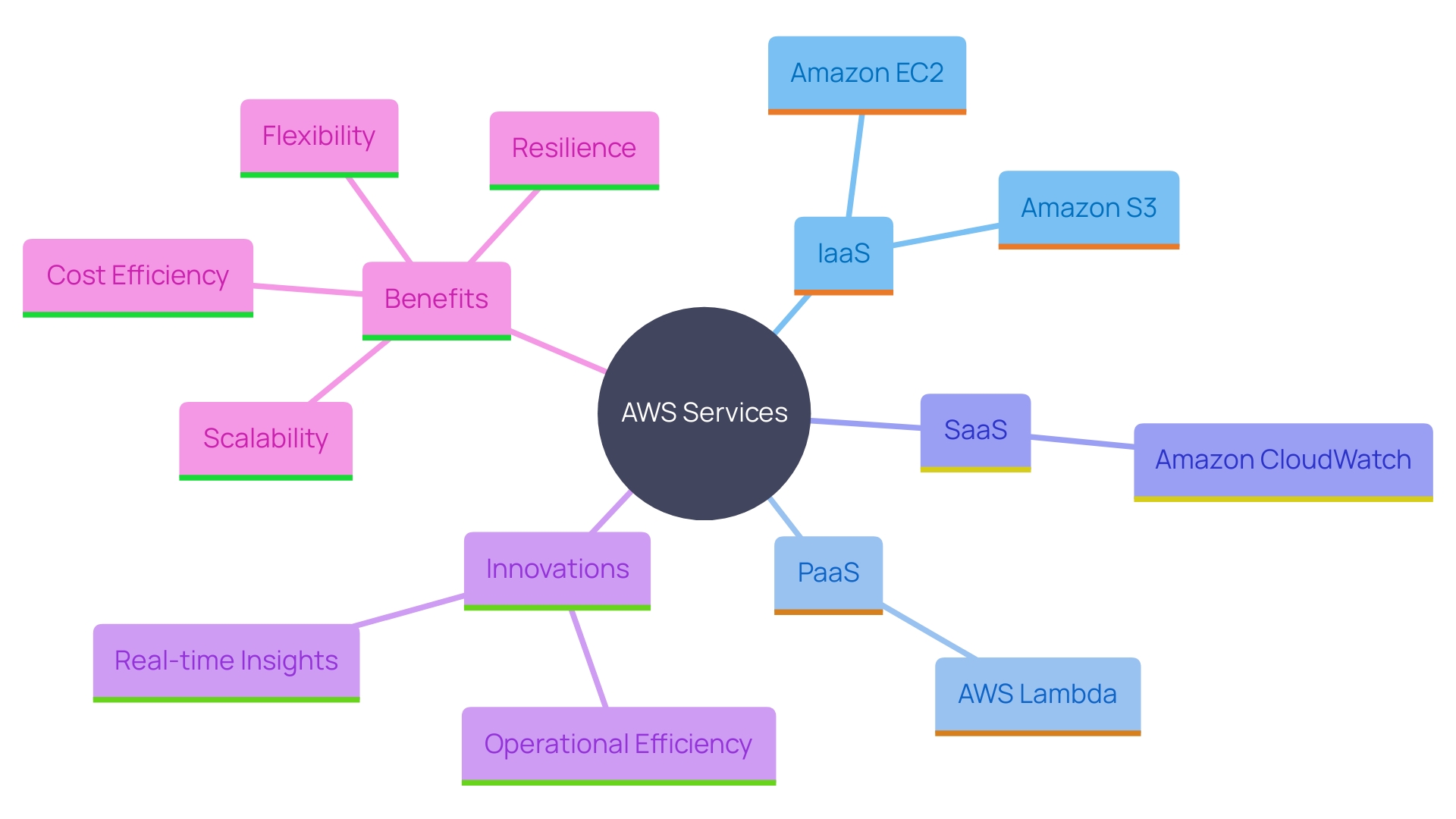
Benefits of Using AWS
Utilizing AWS offers numerous advantages to organizations aiming to enhance their IT capabilities. Primarily, it eliminates the need for significant upfront capital investments in hardware, allowing organizations to adopt a pay-as-you-go model. This approach ensures cost-effectiveness, particularly benefiting startups and small businesses. Axiata's choice to transition more than 650 offerings, including 80 machine learning applications, by the conclusion of 2024, highlights the scalability and efficiency of AWS. Furthermore, AWS's global infrastructure provides low-latency access to applications, significantly improving user experience.
The platform supports rapid deployment and scaling, essential for managing fluctuating workloads. For example, Clarity AI utilizes AWS to create a thorough sustainability analysis product, employing managed solutions to enhance time to market and reduce operational expenses. This is achieved through services like Amazon Elastic Kubernetes Service (Amazon EKS), which manages the availability and scalability of their Kubernetes control plane. These capabilities enable organizations to build scalable, flexible, and resilient IT infrastructures, meeting the evolving needs of enterprises as technology advances.
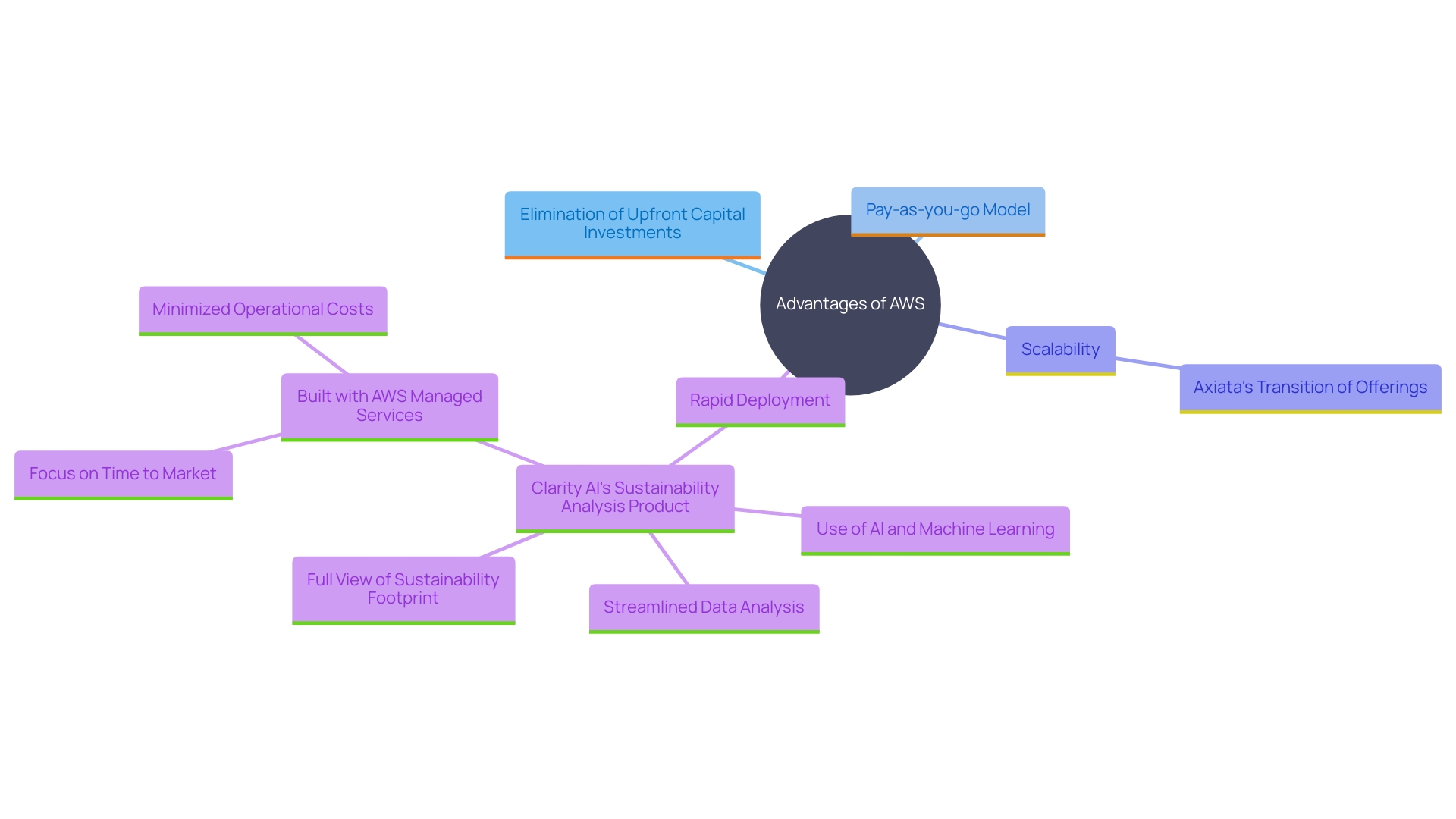
Scalability and Elasticity in AWS
AWS stands out for its remarkable scalability and elasticity, empowering organizations to dynamically adjust resources based on demand. Services like Auto Scaling and Elastic Load Balancing allow organizations to automatically manage resource allocation in real-time, responding to traffic and usage patterns with precision. This agility ensures optimal performance, particularly during peak loads, without compromising the quality of assistance. By leveraging these features, companies can maintain cost-efficiency, paying only for the resources they actively use. This method corresponds with the wider trend of service providers delivering scalable, high-availability solutions to address the changing requirements of contemporary enterprises.
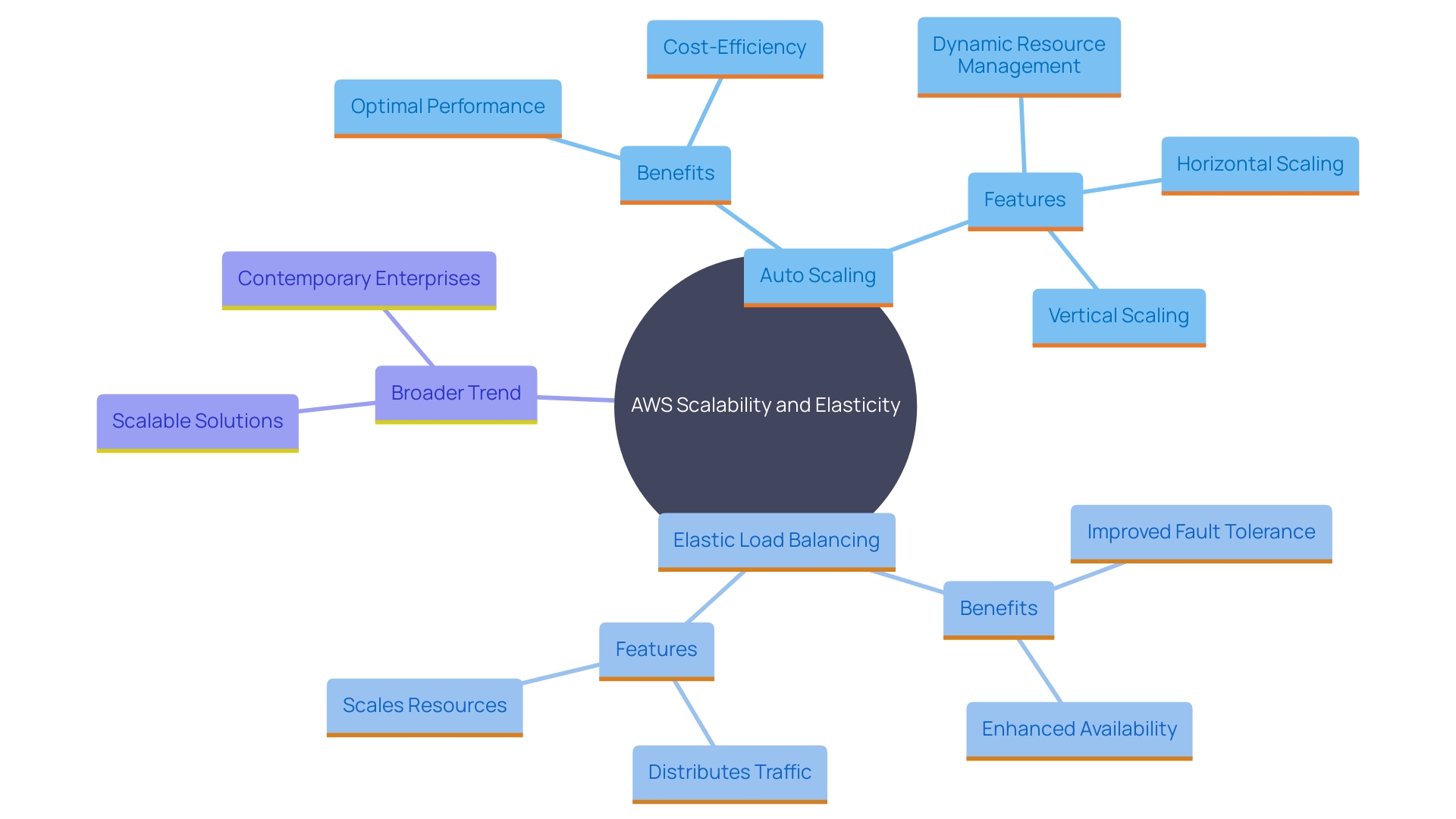
Security and Compliance in AWS
Safety continues to be a crucial issue for companies utilizing online services, and AWS tackles this with a comprehensive array of security tools and compliance certifications. The platform functions under a shared responsibility framework, where AWS oversees the security of the infrastructure, and customers are responsible for securing their applications and data. AWS Identity and Access Management (IAM) is a vital tool for access control, providing an efficient way to manage permissions and access to resources. AWS Key Management Service (KMS) offers robust encryption capabilities to protect sensitive data, while AWS Shield delivers advanced DDoS protection, safeguarding applications from potential threats.
AWS's commitment to security extends beyond these tools. The platform undergoes continuous improvements, adding new capabilities to help customers experiment and innovate rapidly. Regular updates, as highlighted in the 'What's New' posts, ensure that users have access to the latest advancements in security, identity, and compliance.
Furthermore, AWS complies with numerous global standards and regulations, making it a trusted choice for industries with stringent security requirements. This compliance includes adherence to the General Data Protection Regulation (GDPR), Health Insurance Portability and Accountability Act (HIPAA), and other critical frameworks.
A notable example of AWS's proactive approach to security is its handling of zero-day vulnerabilities. When a security flaw was reported, AWS committed to a review and provided weekly updates on their progress. Within 90 days, they successfully rolled out a global fix, showcasing their dedication to responsible disclosure and maintaining customer trust.
AWS's security infrastructure is widely recognized for its reliability. As Amazon's Chief Security Officer, Steve Schmidt, noted, “To me, it’s playing chess while practicing psychology,” emphasizing the intricate and strategic aspect of upholding strong online security. This strategic approach ensures that AWS remains at the forefront of online security, offering unparalleled protection for its users.
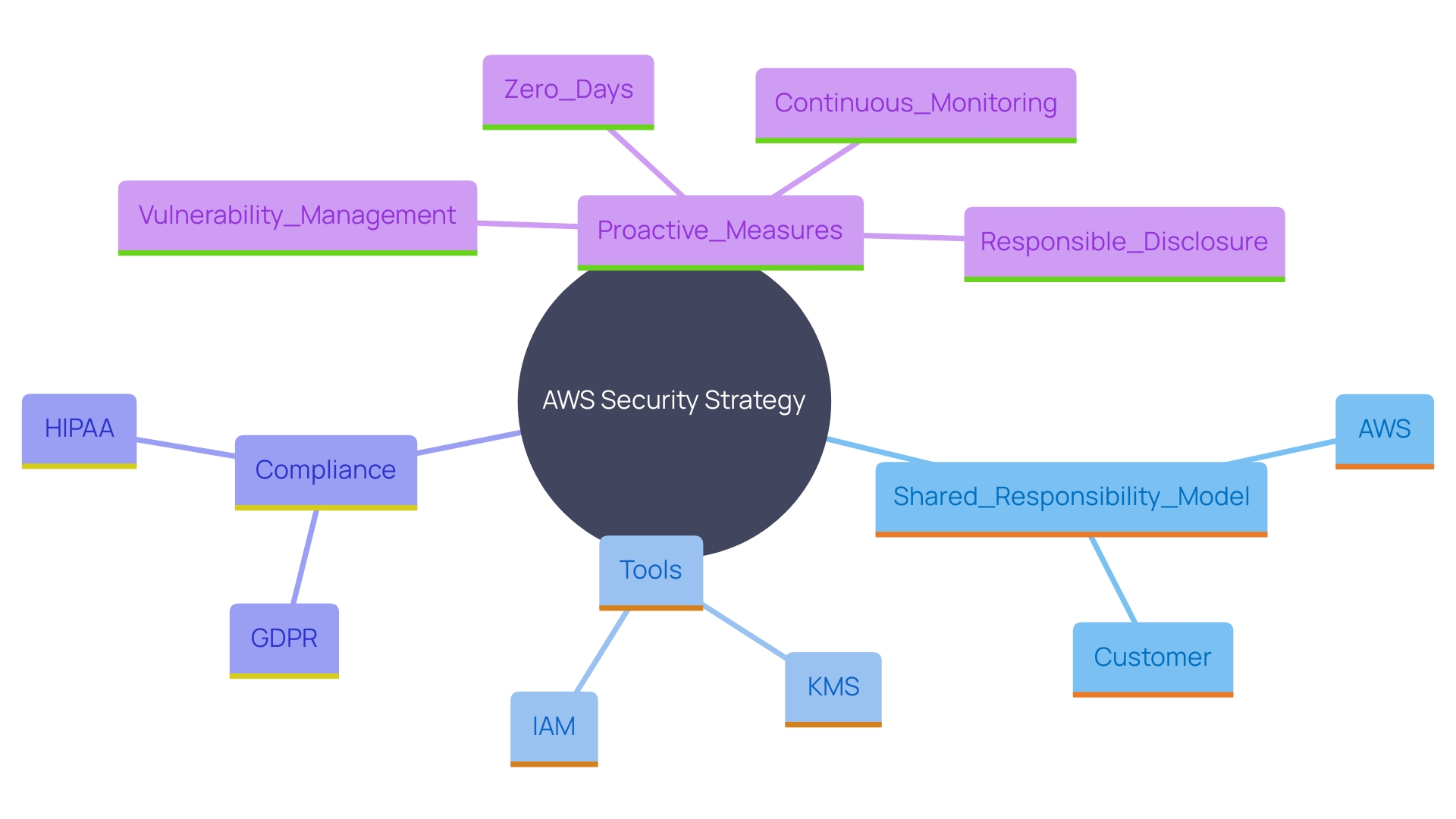
Global Deployment and Agility with AWS
AWS's extensive global presence, with data centers strategically positioned in multiple regions worldwide, allows organizations to deploy applications closer to their end-users, resulting in reduced latency and enhanced performance. This expansive reach supports enterprises in achieving agility, enabling them to swiftly launch and scale applications in new markets without the complexities typically associated with traditional infrastructure setups. For instance, during a prototyping engagement, AWS specialists collaborated closely with ICL's development team to monitor their mining screeners, showcasing the hands-on support AWS offers to its clients. Furthermore, AWS's varied deployment choices, such as multi-region architectures and hybrid solutions, enable organizations to stay adaptable to market changes and customer demands. This flexibility is crucial in today's fast-paced environment, where the ability to adapt quickly can significantly impact a company's success. The implementation of AWS offerings also allows for immediate understanding of the performance and well-being of the AWS ecosystem, permitting organizations to create scalable, adaptable, and robust IT frameworks in the virtual space, ultimately fostering innovation and expansion.
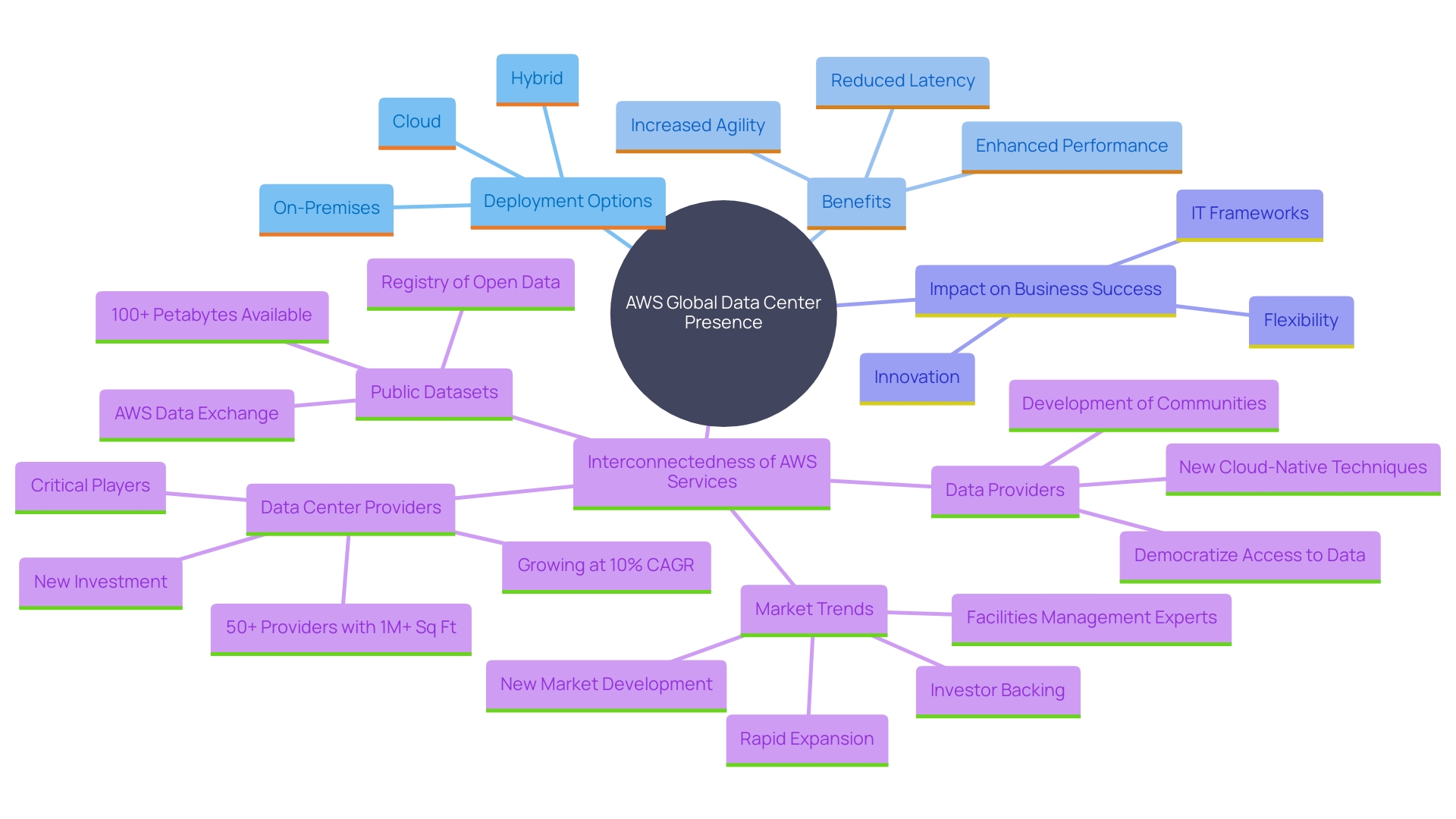
Innovation and Community Support in AWS
AWS fosters a culture of innovation and continuous improvement by providing access to cutting-edge technologies and a thriving community of developers and partners. The platform regularly introduces new services and features, enabling businesses to leverage the latest advancements in technology. For instance, AWS recently introduced integrations aimed at a 'zero ETL future,' significantly simplifying data management processes. Moreover, AWS provides comprehensive documentation, training materials, and support communities that enable users to optimize their investments in the digital platform. This community-driven approach facilitates knowledge sharing and collaboration, helping organizations stay at the forefront of cloud innovation. As Adam Selipsky, CEO of AWS, highlighted, 'We are relentless about working backwards from our customers' needs and their pain points... and we're the most secure and the most reliable.' This commitment to customer-centric innovation is evident in AWS's global infrastructure, which spans 32 geographic regions with plans for more, ensuring unparalleled reliability and scalability.
Conclusion
AWS stands out as a leader in cloud computing, offering a robust suite of services designed to meet various organizational needs. Its offerings, including IaaS, PaaS, and SaaS, enable businesses to deploy applications efficiently while optimizing costs. Key services like AWS Lambda and Amazon S3 facilitate operational efficiency and innovation.
The platform not only provides cost savings but also supports rapid deployment and scalability essential for managing fluctuating workloads. Companies such as Axiata and Clarity AI illustrate how AWS helps create scalable IT infrastructures, emphasizing its effectiveness. Additionally, AWS prioritizes security and compliance, ensuring that organizations can trust their data protection according to global standards.
AWS’s global infrastructure further enhances its value, allowing businesses to reduce latency and improve performance through strategically located data centers. This capability is crucial for responding quickly to market changes. Moreover, AWS fosters innovation by providing access to cutting-edge technologies and a supportive community that encourages continuous improvement.
In summary, AWS serves as a vital partner for organizations looking to effectively leverage cloud technology. Its extensive features, commitment to security, and focus on customer-driven innovation establish it as an essential asset for achieving sustainable growth and maintaining a competitive edge in the digital landscape.




